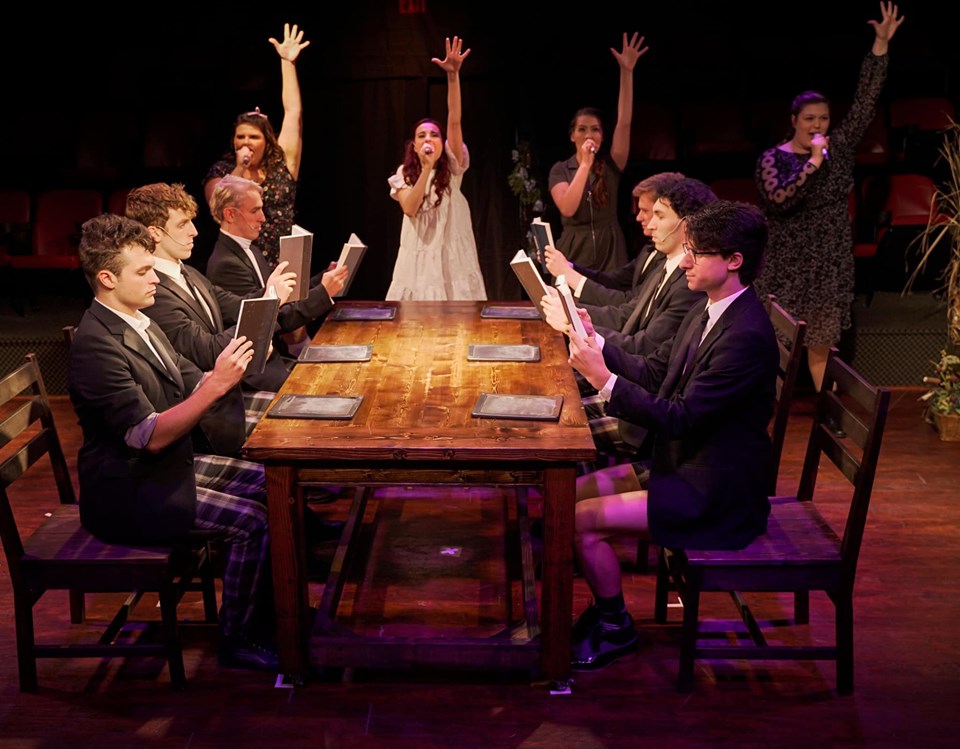by Claire DeMarco, ‘Burgh Vivant
Everybody has issues, especially a group of young adolescents in late 19th century Germany in rock opera retelling of Frank Wedekind’s “Spring Awakening.”
Wendla (Victoria Buchtan) is curious about where babies come from. Her mother (Barbara Burgess-Lefbevre, playing multiple roles) avoids the question, coming up with an innocuous explanation that leaves Wendla still befuddled.
Meanwhile in the schoolroom we’re introduced to the boys: Melchior Gabor (Ian C. Olson), Moritz (Ryan Wagner), Georg (Tommy O’Brien), Hanschen (Connor McNelis), Ernst (Palmer Masciola) and Otto (Jeremy McCawley). Moritz has several problems – he’s performing poorly in school, evidenced by an angry school master (Brady Patsy, also playing multiple roles), and he’s been having sexual fantasy dreams. Moritz cajoles Melchior into helping him understand those nocturnal nightmares. Mechoir assists by writing an essay about sex, complete with lewd diagrams.
Wendla socializes with her friends and the subject turns to boys. Melchior seems to be their favorite. Martha (Sabina May) blurts out that her father has physically abused her. Wendla, Anna (Mar Puet) and Thea (Marnie Butler), are appalled at this information, and promise Martha that they won’t tell anyone about her dilemma. Martha does not want to end up as Isle (Madaline Struhar), a victim of abusive parents who was kicked out of her parent’s house.
Wendla encounters Melchior in the woods and is so traumatized by Martha’s abuse that she confides in him. She insists that Melchior beat her with a stick so she can feel what Martha went through. He obliges.
Aghast at what he has done Melchior meets Wendla again and asks for forgiveness. Feelings they have for each other escalate and they have sex.
Moritz fails at school. He is berated by his father for humiliating the family name. The boy commits suicide.
Wendla is ill with what she thinks is anemia but learns that she is pregnant. Her mother is horrified, blames her and finds a back-alley abortionist. When it’s discovered that Melchior, he is sent to a reformatory.
Melchior finds out that Wendla is pregnant while he is incarcerated. He escapes and attempts to meet Wendla, first visiting Moritz’s gravesite, attempting to pull his life together.
While there he is faced with several additional shocks that will affect him forever.

Buchtan shines as the innocent caught up in time when “too much information” seems to be the standard. Her rendering of “Momma Who Bore Me” is powerful.
Olson was somewhat uneven in Act I (probably due to opening night jitters) but he came to life in Act II. His delivery of “Left Behind” was especially poignant.
Wagner pulls us into the soul of his character as he changes from an insecure teenager to a despondent soul.
In his multiple roles, Patsy cleverly changes from a stoic school master to a reprimanding father to a sympathetic doctor with ease.
This is a well-balanced, musically talented cast that compliments one another.
The choreography and general movement were stunning. Kudos to Fight Choreographers Barbara Burgess-Lefebvre and Zakk Mannella and Dance Captain Victoria Buchtan.
Note: At times with a theater in the round stage, those actors with their backs to the audiences are sometimes not heard, even with microphones in the small venue.
Another Note: In Act I, specifically, there was static noise emanating from the sound system.
“Spring Awakening” focuses on teenagers in the late nineteenth century in Germany who are awakening to their sexuality. Teenagers today also question their sexuality and intimacy but for the most part there’s a healthier, more open conversation about it.
“Spring Awakening” won the 2007 Tony Award for Best Musical with music by Duncan Sheik, book and lyrics by Steven Sater. The original play written by German dramatist, Frank Wedekind, in the early 1890’s.
-CED
“Spring Awakening” is a production of Comtra Theatre, 20540 US-19, Cranberry Township, PA. 16066. It runs from August 2 – 17. For more information, click here.


